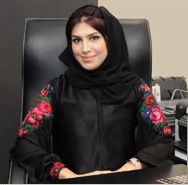 Masooma Habibi remembers her hands bleeding after weaving carpets with her mother in Iran when she was 5. Now she is part of a delegation of entrepreneurs chosen to take part in President Obama’s Summit on Entrepreneurship starting today in Washington. She is proving that women can build businesses in traditional Muslim societies — and succeed if they never give up.
Masooma Habibi remembers her hands bleeding after weaving carpets with her mother in Iran when she was 5. Now she is part of a delegation of entrepreneurs chosen to take part in President Obama’s Summit on Entrepreneurship starting today in Washington. She is proving that women can build businesses in traditional Muslim societies — and succeed if they never give up.
Masooma finished high school with top grades in Iran, but when her father became sick, her family went back to Afghanistan where women were unwelcome in the business world.
Habibi spoke decent English and had computer skills, but, as a woman, she couldn’t get a job in the city where men looked down on women. So Habibi decided to move to Kabul where attitudes toward women are not as harsh.
A breakthrough in her career came when Habibi was accepted into 10,000 Women, a business management program sponsored by investment company Goldman Sachs at American University in Afghanistan. (The goal of 10,000 Women is to provide 10,000 underserved women around the world with a business and management education.) She graduated from it with new skills and a valuable trait — self-confidence.
In 2007, Habibi decided to start her own business and enlisted her two brothers, who studied electrical engineering, as partners. Together they launched Check Up Company to provide consulting services in electrical engineering. Habibi hoped to seize opportunities in the power market, where many people lack access to electricity or have to endure frequent outages. She faced competition from experienced international companies.
Habibi launched her business after she persuaded two private investors to give her capital in exchange for company shares. It wasn’t a smooth ride. Many Afghani businessmen didn’t want to deal with her because she was a woman, despite the fact she co-runs the company with three male executives. Her parents didn’t want her to be a businesswoman either because relatives and neighbors kept asking: Why is she working like a man instead of getting married?
“Sometimes, I wanted to stop and quit,” she said.
But she hasn’t. “Something in my heart said: ‘Don’t stop! Try harder!’” Habibi said. She appeals to the self-interest of distrustful businessmen, citing examples of companies that had benefited from Check Up’s advice. Sometimes she urges them to provide more job opportunities to women in their own businesses. Some grudgingly have acted on her exhortations. And even a few who first objected to a woman-run business, have called her back and hired her company.
Check Up, which employs 22 people, hasn’t broken even yet. But it presses ahead. Recently, it has worked on building projects in Mazar-e-Sharif and a hospital project in Herat. Eventually, Habibi, who will attend the April 26-27 Presidential Summit on Entrepreneurship in Washington, wants Check Up to become the number 1 power company in Afghanistan and create many jobs. But for now, she wants Check Up to gain more experience, upgrade its services and wait for security to improve.
“We Afghans are patient people,” she said.




















This is very exciting, to say the least! Along with Women for Women international, Madre, and other organizations, the women’s movement is not forgotten, and in fact, I predict a major revival, with origins this time, in countries where it is needed most. Masooma, You Go Girl!